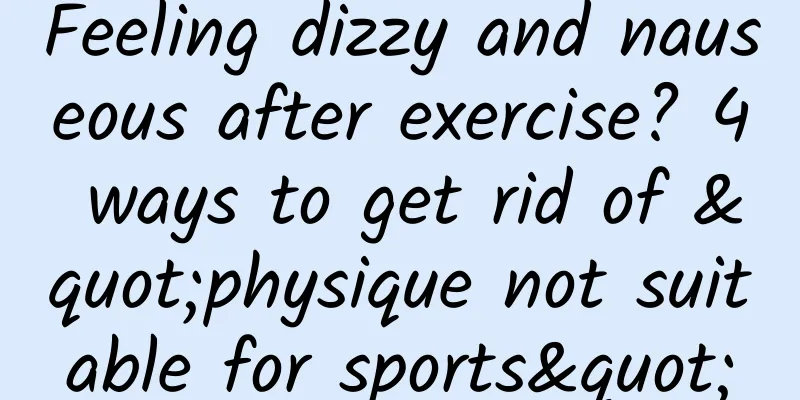Feeling dizzy and nauseous after exercise? 4 ways to get rid of "physique not suitable for sports"

|
When exercise becomes a new fashion trend, how could office workers who are at the forefront of the trend miss it? However, many office workers who originally had no habit of exercising experienced symptoms of dizziness and nausea after exercising, and since then have concluded that they are "not suitable for exercise." Experts say that for novice athletes, dizziness and nausea are common problems, but as long as you implement the four principles in your daily life, you don’t have to worry about side effects ruining your interest in exercise. Two major reasons for dizziness after exercise: intense exercise, fasting exercise Sports and fitness are popular. Many office workers put on sports shoes after get off work or on holidays, join group road running, or go to the fitness center to do aerobics, pedal flywheel or do weight training, but many of them will have the trouble of dizziness and vomiting after exercise! Li Zheyu, a fitness coach, said that there are two main reasons for feeling dizzy and nauseous after exercise: the first is "lack of exercise in daily life and doing strenuous exercise when you move", and the second is "fasting for too long or eating too little before exercise". Intense exercise and rapid breathing can lead to hypoxia The first situation is most common among sedentary people who have no exercise habits in the past. They "overdo" when they start exercising, doing high-intensity exercise or constantly training their leg strength, which results in hypoxia in the body or a sudden drop in blood sugar, leading to dizziness and vomiting. In addition, people who use the holidays to repay their "exercise debt" and concentrate on training for a week's worth of exercise on their days off are also prone to physical discomfort due to sudden intense or excessive exercise. Coach Li Zheyu pointed out that if you usually do very little exercise and then do strenuous exercise, your heart rate will suddenly accelerate and your cardiovascular system will expand rapidly. Not only will the human body be unable to adapt, causing an imbalance in the body's electrolytes, water and sugar-breaking mechanisms, but the body will also lack oxygen due to rapid breathing, and insufficient time for carbon dioxide to be converted in the body, which can easily lead to hypoxia and dizziness. If you hold your breath while doing weight training, you may feel like vomiting. Exercise on an empty stomach can easily trigger hypoglycemia As for "fasting for too long or eating too little before exercise", the direct impact is that it will cause blood sugar to drop. When a person's blood sugar level is too low, they are prone to symptoms such as dizziness, headache, vomiting, and weakness. In addition, when doing lower limb exercises, blood will be concentrated in the lower body and difficult to flow back to the upper body. If you do not eat or only eat a little before exercise, the upper body and brain will lack nutrients and oxygen brought by blood circulation, which can easily lead to symptoms of dizziness and vomiting. 4 tips to prevent dizziness and vomiting after exercise To overcome the problem of dizziness and vomiting after exercise, coach Li Zheyu emphasized that you must grasp the four principles of healthy exercise:
|
<<: Salads must be low in calories? Be careful, there are mines here.
>>: Do sugar-free drinks help you lose weight? Artificial sweeteners may make you crave more
Recommend
What are the dietary taboos for ovarian cysts?
What are the dietary taboos for ovarian cysts? Ac...
What fruits can't you eat after a miscarriage? You can't eat oranges
You cannot eat oranges after an abortion. Oranges...
What drugs can effectively relieve pain during dysmenorrhea infusion?
Once dysmenorrhea occurs, if the situation is not...
How to make sure the abortion is clean? Will there be bleeding if the abortion is not clean?
After an abortion, you can judge whether it is cl...
Can I have a painless abortion during breastfeeding?
There are more and more cases of accidental pregn...
Can ovarian cysts be delivered naturally? Will they disappear on their own?
Ovarian cysts are a relatively common gynecologic...
When is the best time to have a painless abortion?
The best time for painless abortion is 35 to 50 d...
Are you tired from working overtime? Walking for half an hour can fight chronic fatigue
When your body sends out fatigue warning signals,...
What are the effects of complete uterine fibroid removal? Does complete uterine fibroid removal have any effect on the body?
What are the effects of complete hysterectomy? Th...
Signs of threatened miscarriage in 3 months of pregnancy
The first three months of pregnancy are a critica...
Will ovarian cysts recur after ovarian removal?
Will ovarian cysts recur after ovarian removal? O...
Skipping dinner to lose weight may lead to malnutrition! 5 foods recommended for dinner to help you lose weight
What you eat for three meals a day is very import...
What are the clinical manifestations of vaginitis?
In recent years, with the increasing incidence of...
I haven’t had my period for a long time. What tests should I do?
I haven’t had my period for a long time. What tes...
Vitamin D deficiency not only causes osteoporosis, but also cancer, dementia and 9 other major diseases!
Vitamin D, known as the "sunshine vitamin&qu...









